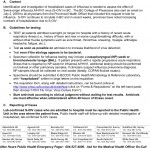Increase Influenza Testing of Hospitalized Severe Respiratory Illness July 26, 2009
Posted by admin in : News , comments closedFor Fraser Health:
A. Context
Identification and investigation of hospitalized cases of influenza is needed to assess the effect of
Swine-origin influenza A/H1N1 virus (S-OIV) in BC. The BC College of Physicians also sent an email on
July 2, 2009 to all physicians from the Provincial Health Officer that included this request to test for
influenza. S-OIV continues to circulate in BC and in recent weeks, provinces have noted increasing
numbers of hospitalization due to S-OIV
B. Guidelines for testing
• TEST all patients admitted overnight (or longer) to hospital with a history of recent acute
respiratory illness (i.e., history of fever and new or worse cough/breathing difficulty, with or
without other flu-like symptoms such as sore throat, rhinorrhea, sneezing, myalgia, arthralgia,
headache, fatigue, etc.);
• Test as soon as possible on admission to increase likelihood of virus detection;
• Test even if the etiology appears to be bacterial;
• Specimen collection for influenza testing may include a nasopharyngeal (NP) swab or
bronchoalveolar lavage (BAL). If patient presents with a rapidly progressive acute respiratory
illness that is negative by NP swab for influenza A/H1N1, additional testing should be performed
on tracheal or other pulmonary samples, if clinicians suspect influenza pneumonia diagnosis.
NP samples should be collected on viral swabs (ideally, COPAN flocked swabs);
• Specimens should be submitted to BCCDC Public Health Microbiology & Reference Laboratory,
with “hospitalized” written in large letters on the requisition;
• The requisition form, along with detailed instructions, can be found online at
(click on “Forms & Requisitions” on the left-hand panel,
then choose “H1N1 Flu Virus: Virus Culture Form”);
• Start antivirals according to clinical judgment without waiting for test results. Antivirals
are most effective when administered within 48 hours of illness onset.
C. Reporting of Cases
Lab-confirmed S-OIV cases who are admitted to hospital must be reported to the Public Health
Unit in the area where the patient lives. Public health staff will follow-up with detailed investigation of
hospitalized, lab-confirmed S-OIV cases.
